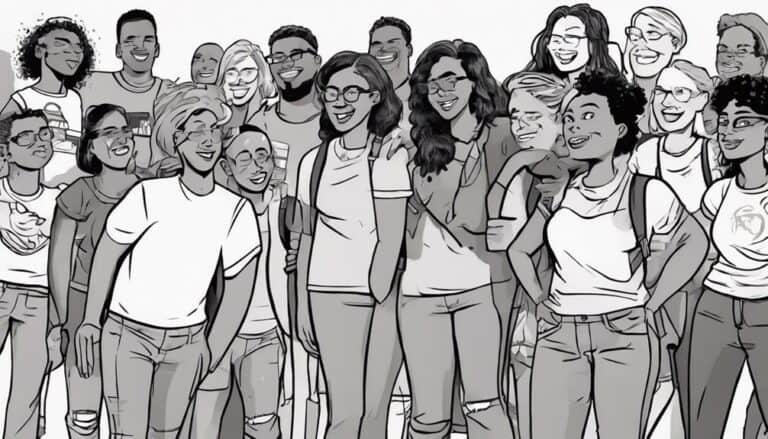When organizing team-building events for a diverse team, pondering the intricate balance of individual differences can be the linchpin to success.
From acknowledging cultural nuances to tailoring communication approaches, each element plays a pivotal role in fostering collaboration and cohesion among team members.
By delving into these considerations, you can pave the way for a harmonious and productive team-building experience that resonates with every participant, leading to enhanced team dynamics and a more unified workforce.
Key Takeaways
- Embrace team diversity by recognizing unique backgrounds and perspectives.
- Select inclusive activities adaptable to diverse abilities and needs.
- Foster open communication and cultural sensitivity within the team.
- Evaluate and enhance team dynamics by accommodating differences and preferences.
Understanding Team Diversity
To foster a truly inclusive and supportive team environment, it's essential to understand the diverse cultural, linguistic, and physical backgrounds of each team member. Recognizing the unique backgrounds, experiences, and perspectives that each team member brings to the table is vital in promoting cultural inclusivity within the team. By acknowledging and respecting the various communication styles present in a diverse team, you can create a more cohesive and understanding work environment.
When planning team-building activities, it's important to adapt them to accommodate and celebrate the diversity within the team. Embracing the richness of diversity by appreciating the unique strengths and talents each team member possesses can lead to a more harmonious and productive team dynamic. By taking the time to understand and value the diversity within your team, you can create a space where every member feels heard, respected, and valued for who they are.
Inclusive Activity Selection
When selecting activities for your team-building events, prioritize inclusivity by considering the cultural, linguistic, and physical diversity of your team members. To make certain that everyone feels included and valued, follow these key guidelines:
- Accommodate Needs: Choose activities that can be modified to accommodate diverse abilities and needs within your team.
- Cater to Different Learning Styles: Provide options that cater to various learning styles and preferences to promote equal participation.
- Avoid Exclusion: Select inclusive activities that don't exclude or make certain team members uncomfortable, fostering a sense of belonging for all.
Communication and Language Considerations
Considering the diverse backgrounds and communication preferences of your team members is important when planning team-building events to guarantee effective interaction and collaboration. To address language barriers within a diverse team, providing translation services or materials in multiple languages can be essential.
Encouraging open communication and active listening helps bridge any communication gaps that may arise. It's essential to implement clear and concise communication strategies to avoid misunderstandings or misinterpretations among team members with varying communication styles.
Creating a supportive and inclusive environment where all team members feel comfortable expressing themselves, regardless of language differences, is key to fostering effective communication. By prioritizing open communication, active listening, and clear communication, you can cultivate a collaborative and cohesive team environment that values the diverse perspectives and communication styles of all team members.
Cultural Sensitivity and Awareness
In fostering a culturally sensitive and aware environment within your team, it's essential to understand and respect the various cultural differences, traditions, and customs present among team members.
To guarantee cultural sensitivity and awareness within your team, consider the following:
- Acknowledge Diversity: Recognize and appreciate the diverse perspectives, backgrounds, and experiences that each team member brings to the table.
- Promote Understanding: Encourage open communication and dialogue to bridge cultural gaps and foster a deeper understanding among team members.
- Respect Traditions: Create an inclusive environment where all team members feel valued and respected, avoiding stereotypes, biases, or assumptions based on cultural identities.
Evaluating Team Dynamics
To effectively evaluate team dynamics, understanding each member's unique strengths, weaknesses, and communication styles is essential for fostering collaboration and cohesion. By recognizing team members' interests, learning styles, and personalities, you can tailor team-building activities to suit the diverse needs within the group. Accommodating cultural diversity and different communication styles guarantees inclusivity and effective collaboration. Evaluating feedback responses and how team members handle challenges can guide you in designing activities that address specific areas for improvement. Additionally, identifying the team's needs, preferences, and goals is vital for promoting engagement and cohesion. Below is a table summarizing key factors to take into account when evaluating team dynamics:
| Key Factors | Description | Importance |
|---|---|---|
| Team Members' Characteristics | Understand interests, strengths, weaknesses, personalities, and learning styles. | High |
| Cultural Diversity | Recognize and accommodate cultural differences within the team for inclusivity. | Medium |
| Communication Styles | Evaluate how team members interact and communicate to facilitate collaboration. | High |
| Feedback Responses | Identify how team members respond to feedback and challenges to improve activities. | Medium |
| Team Needs | Design activities based on the team's preferences, needs, and goals for engagement. | High |
Evaluate these factors to enhance team dynamics and ensure successful team building events.
Conclusion
To summarize, when planning team-building events for a diverse team, remember to embrace the uniqueness of each team member.
By considering factors such as communication styles, cultural sensitivity, and inclusive activity selection, you can create a harmonious and engaging experience for everyone involved.
Just like a well-oiled machine, a diverse team that works together seamlessly can achieve great things.
Keep building those bonds and watch your team thrive!

